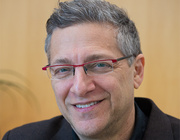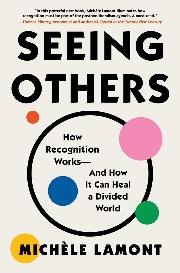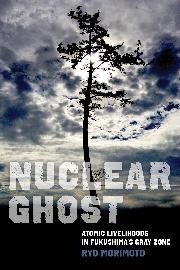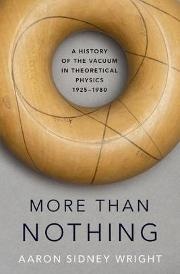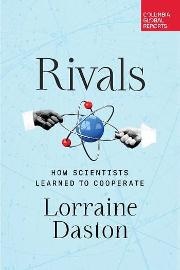Citation:
Abstract:
Dr. Marco Forgione (University of Milan), COSMOS team member, interviewed Prof. Peter Galison (Harvard University) in occasion of the event “Photographs from Outer Space”Read on COSMOSproject.unimi.it
Full Text
MILAN, Italy
13 December 2023
MF:
Good morning Professor Galison, it is a pleasure to have you here today and thank you again for agreeing to have this interview with me. Let us start with a general question about your participation as keynote speaker in the event `Photographs from Outer Space’. Could you briefly tell us about your movies that were screened yesterday, and about your presentation today?
PG:
I wish to thank the University of Milan for organizing and inviting me to this event on the history of astronomical photography, with a special attention to the contributions of women to the history of astrophotography. Both themes that are important.
Yesterday, the conference screened two of my films, starting with Black Holes | The Edge of All We Know, which is a feature length documentary movie about black holes. In particular, the movie tracks two long-term collaborations: one, with Stephen Hawking, was designed to see how much information could be stored on the horizon of a black hole, and the other was to make the first picture of a black hole. Throughout, the film carries forward philosophical questions about what counts as scientific knowledge. The second movie shown was an animated short—I made it during the pandemic—called “Shattering Stars”. It is about the great astrophysicist Subrahmanyan Chandrasekhar and how he came in the period around 1930 to have an account of how black holes at the small scale could form in the collapse of stars. For that work, and to his great surprise, he was attacked by his thesis advisor, Sir Arthur Eddington. I showed those two films, and then we had an interesting discussion about the nature of films and about the relationship between documentaries and science. I thought the audience here, and the others who came from the conference, had extremely interesting questions to ask and so we had a very productive discussion.
Today, I was asked to give a keynote address for the conference. I focused on three periods, beginning in the early 20th century when Annie Jump Cannon [1863-1941], came to a way of classifying stars by their spectra, which had a very profound effect on the development of astronomy. She was in many ways marginalized by the astronomical community that needed her classification system and the enormous skills that she had. The astronomical community wanted to relegate her and her associates to an almost mechanical procedural way of classifying the stars by their spectra—but it was anything but automatic. Afterwards, I talked about the work of Marietta Blau, a young physicist in Vienna in the 1930s who did groundbreaking work, leading in many ways towards the beginning of elementary particle physics. She took pieces of film plates, and let cosmic rays from the heavens skitter along their surface. She was then able to show remarkable new effects about what could happen to the nucleus of an atom, at a time when all of this was brand new. Then there was the work in Bristol, UK, under the direction of C.F. Powell, where again, women were in the role of scanning and looking for effects in nuclear emulsions. But they were often marginalized when it came to crediting them for discovering those new things that were found by developing the films, and by looking at them with enormous precision under a microscope. Finally, the third part of the talk was about the Event Horizon Telescope and the work that went towards making the first image of a black hole, with the inevitable complexities and epistemological aspects of that work. Again, I aimed to show that women were not always treated equally, especially by the press and outside groups.
MF:
There was not enough recognition for the work they were doing?
PG:
Yes. And I felt strongly at the time that women met critical responses that seemed quite on the edge of being discriminatory.
MF:
So why do you think black holes deserve careful attention from philosophers and historians of science? Why are they interesting not only for physicists, but also for the communities of philosophers and historians?
PG:
There are many riveting objects in the sky. Neutron stars, for example, are incredibly interesting. Spinning neutron stars can send out pulses, becoming pulsars, and those pulses can be used to make all sorts of progress in demonstrating the existence of gravity waves, and many other things. But neutron stars don’t interest mathematicians, philosophers, science fiction writers, visual artists. Black holes do.
There are these very many strange things about black holes. They are some of the most mysterious objects in the world, and they have a paradoxical quality that I think elicits attention across the disciplinary map. They’re the darkest objects—they don’t reflect light; they don’t emit light—and yet they’re the brightest objects. They shoot off these jets of luminous material that can stretch longer than the size of galaxies. They’re the simplest objects, almost like an electron: all you can say is their mass and their spin, that’s it. At the same time, black holes are the most complex objects because they must, in some ways, store vast amounts of information about all the objects that fell in to make them. For instance, many physicists believe, as I do, that that information must be somewhere.
Black holes also are objects of tremendous mathematical interest: they present problems about differential equations, for example, that opened up new fields of inquiry. They’re defined in a certain sense by the horizon, this one-way membrane that allows things to fall in but not to get out. And this idea of a causal membrane makes them a kind of edge of the universe. There’s no knowing what lies beyond that horizon. And in that sense, I think, this interests philosophers. There’s a way in which, in black holes, once you pass through the horizon, the roles of space and time are reversed.
Additionally: could you form a closed loop and, in a sense, meet an earlier state of yourself inside a black hole? So then black holes, since the time of Hawking in the 1970s, seem to act like thermodynamic objects. That is to say, there seems to be a temperature that you can associate with them, an entropy that you can associate with them, an energy that you can associate with them. And philosophers are interested in really exploring that idea: to what extent are they, in fact, thermodynamic objects, in more than a mathematically analogous way? Do they come into equilibrium, and what happens when they merge? Are there paradoxes or interests to be gained from pursuing, on a philosophical level, the nature of these things as thermodynamic objects? So, I think, for these and for other reasons, black holes sort of present limit cases to the strangeness of the world.
Here is a practical intersection: when we were working on the imaging paper [in the suite of papers that presented the first image of a black hole], our discussions ranged widely, from Bayesian analysis to computer vision, from astrophysical effects to the philosophy of objective imaging.
MF:
I would like to follow up on this, if you don’t mind. Neutron stars are not very common objects either, rather, they’re exotic objects too. But philosophers seem to be more interested in black holes than in neutron stars, so why is that the case?
PG:
No two neutron stars are alike, even if they have the same mass and the same spin. There’s a thermonuclear burn going on at the surface, irregularities—mountains and valleys, so to speak–and so every neutron star is different. Neutron stars don’t, in that sense, seem to be fundamental objects in the universe. They’re particular objects, whereas two black holes that have the same charge, spin, and mass are identical in classical terms. In that sense, black holes represent something irreducibly simple, like an electron or a quark, and I think that that makes them an object of interest to theoretical physics or mathematics in ways that are just not true for neutron stars. Nobody thinks that a neutron star is like an elementary particle. It’s not simple. There’s nothing structureless about a neutron star. I mean, for astronomers, neutron stars are quite interesting, but astronomers are also interested in studying a particular galaxy, or a colliding galaxy, or a galaxy that has strange features. But physicists are not, and I think philosophers perhaps are closer in that sense to the physicists in wanting to know about the fundamental features of the world as opposed to the world in all of its infinite variety.
MF:
We have recently created a network, the COSMOS network, which gathers philosophers of science, cosmologists and historians of science, to promote the philosophy of cosmology and astrophysics through a number of initiatives. For example, we have organized virtual labs, conferences, workshops and so on. So, I guess my next question will be: what do you think about the interaction between history, philosophy, and cosmology today, and if you think that such interaction is relevant, why do you think that? So, the question this time is not just related to black holes, as the previous question, but it is more about the take of the philosophy of cosmology in general, and whether it is important to science.
PG:
I would say that at a very broad level, one of the very promising changes in the philosophy of science in recent years has been an interest in the practice of science, in laboratory science, in the procedures of theoretical physics, not just in the abstract. That is, there has been a turn away from the universal characterization of, for example, causality, inference, prediction, or explanation. Taken in full generality, such traditional problems of philosophy of science are often quite removed from what scientists are doing now—as opposed to 50, 100 or 300 years ago. So, for example, philosophy of science has had a longstanding interest in non-relativistic quantum mechanics and in special relativity, but it’s taken a while for it to be engaged with the current frontiers of science, but it is high time—and current work is now working hard to grapple with contemporary practice. This turn-toward-practice makes possible true collaboration with other fields within the broad rubric of science studies: history of science, sociology of science, ethnography of science.
Cosmology itself had, of course, an enormous transformation after Einstein’s 1915 general theory of relativity, when Einstein himself in 1917, and others, Walker and many others to follow, began looking at solutions of Einstein’s equations for the universe as a whole. And suddenly there was a scientific field, or a physical scientific field of cosmology that began to develop, and that was amplified enormously by the discovery of the cosmic microwave background radiation. That discovery really made cosmology for the first time not only a theoretically vibrant area, but one that had an observational component beyond the velocity-revealing redshifts that Edwin Hubble began. Much changed too with the first demonstration of the microwave background—and the more recent, astonishing work by COBE [1989-93] and then the WMAP [2001-2010] in examining fluctuations in the microwave background. Suddenly, we have clues about constraints on theoretical cosmology, or put another way, cosmology is now an experimental science. So that now cosmology is a field, on the one side probing the limits of what we understand about the theory, and on the other side giving us enormous insight into the world with some very big open questions.
Dark matter and dark energy, the acceleration of the universe, its expansion, whether it might eventually be able to really test our fundamental assumptions about physical theory. I think this all makes it a vibrant area of work, and so I think philosophy getting involved with this active research arena—across observation and theory—is of prime importance. What kind of questions we should be asking, what kind of things count as evidence in this new era of cosmology, what does it means to have a science that only happens once [pace a bouncing universe]? How does cosmology extend and expand our concept of what a science is?
MF:
So, it is as if cosmology now has become a more mature science and philosophy can jump in to scrutinize its foundations, something like what we have with the foundations of non-relativistic quantum mechanics.
PG:
Yes, I think these areas of cosmology and astrophysics of black holes can play a vibrant role, indeed, much the way the relativities [special and general] and quantum mechanics did for philosophy in the 1900s, 1910s and 1920s. These are highly interdisciplinary fields, even within the sciences. We now have groups combining gravitational waves with electromagnetic information about black hole mergers, for example. I think astronomy is in an astonishing state where interdisciplinarity within astronomy is coming more and more to the fore. And I think philosophy can play, or history and philosophy can play, an important role there. I mean, philosophers played an important role in the development of quantum technologies. The interests of Abner Shimony and others, who were philosophically-minded physicists and physics-minded philosophers, helped push forward the pursuit of entanglement as fundamental, and there really was something interesting philosophically and physically about those entangled phenomena. So, I think that there’s a role for philosophy also in black hole science and in cosmological sciences too. I think it’s not that philosophers should stand back and grade the work of the scientists. Quite the contrary. I think we need a dialogue between philosophers, astronomers, observational astronomers, and theorists that can help sharpen questions and figure out how to understand some of these riveting new developments.
MF:
You mentioned the interdisciplinarity of cosmology, which was also evident in your movie Edge of All We Know. The research teams were not just physicists or theoretical physicists, there were also computer scientists and various engineers; it was a collaborative effort in that sense. But then there was also this part in your movie that covered more of the theoretical aspects of research in physics, with a small number of theoretical physicists like Stephen Hawking and collaborators. So, it emerged from the movie the difference between observational cosmology and theoretical cosmology. Do you think that this difference is important to philosophy? Also, can philosophers say something about how sometimes subfields of physics, like cosmology, can be so neatly divided into the practices of the experimenters and those of the theoreticians?
PG:
To me, collaboration does not mean homogenization. Collaboration means recognizing differences of approaches and figuring out ways that these different approaches can speak to one another. So, I don’t think that theorists should become observers or experimentalists, nor do I think experimentalists need to become theorists. But they do need to figure out ways to address one another, and sometimes that means the creation of a common vocabulary at the intersection. But that doesn’t mean that, fundamentally, the concerns of Hawking are the same as the concerns of an astrophysicist interested in making an image of a black hole. In order to talk about working together towards a common goal there has to be enough communication and communicability for collaboration to function.
At the end of my discussion today, I talked about the work to observe the photon ring: this light that goes into orbit and creates a kind of light sphere around the black hole. That work really began as a collaboration between theorists and astrophysicists, between fundamental physics astrophysics, and perhaps in a certain sense with philosophy. So, I do think that having contact between these different but collaborating groups can be enormously productive. And that’s the kind of thing that I have in mind as a role for philosophy, too. I think philosophy can be engaged in discussion with the sciences. Philosophy needs to not stand aside and just be evaluative or, worse, finger-wagging and saying, “Don’t do this, you should do that.” Rather, philosophy should contribute to discussions about refining the way we pose problems.
MF:
This leads me naturally to the next question. While all these subfields, as you were saying, need to communicate and develop a common language, they are also very technical on their own. I think about the H0 problem, where many discussions revolve around systematics, algorithms, data analysis, and how to reduce background noise. Then, one might wonder, what is it that philosophers can do to contribute to the discussion, and what is their role, since they do not necessarily have the technical expertise proper of those scientific fields?
PG:
Well, I think there are, potentially, different roles. In my work, I’ve spent a lot of time looking at those arenas that can be held in common to very different approaches: I’ve called them trading zones. In these trading zones, you develop a kind of hybrid pidgin, jargon, or creole language of a technical sort that allows people to communicate, even though they have different assumptions about what the ultimate constituents of nature might be. They may disagree about the role of mathematics, but they can nonetheless communicate. That happened, for instance, in the discussion between mathematicians and string theorists as they began to develop enough of a common language so that they could communicate and work together. And that’s happened many other times: for instance, in the early days where chemistry and biology, or chemistry and physics, or physics and biology created trading zones between them that allowed the growth of things like a truly chemical physics, or physical chemistry, or biochemistry, or biophysics. Those hybrid fields had to grow up by developing coordinative language, and it may be that, in some cases, we need that sort of trading zone to exist between the theorists and the philosophers, or between the experimentalists and the philosophers to have enough common language to be able to pose questions together. In the case that I talked about today, in the image group on the Event Horizon telescope, we found a certain amount of common concern around questions like: what is objectivity, what are the modes of creating robust images?
MF:
In 2012, with the discovery of the Higgs Boson, and the subsequent years when experimental physicists invested many resources looking for evidence of SUSY, some commentators started asking what kind of cultural advancement these large research projects would bring to the community. For example, I remember a debate between Peter Mättig and Sabine Hossenfelder about whether we should build the next large particle collider. I would like to ask you the same question, but now in the context of large cosmological projects such as: Planck [launched in 2009], James Webb Telescope [launched this year], LISA [expected in 2037], Next Generation Event Horizon Telescope, etc. What is the cultural contribution that these large collaborations bring to society (beside the intrinsic and unquestioned scientific interest)?
PG:
I think the question about the origin and fate of the universe is a question of deep and transcultural concern that has been with us as far back as we know. Accounts of creation have been discussed whatever they are, and it seems that most cultures do have some account of where the world comes from. And so, I think it’s more than just a passing cool interest; it resonates with themes that have been part of our mythic, religious, scientific concern for thousands of years. People do want to know about that to the extent that something like the James Webb Telescope, or the other big observatory platforms can address the question of the very early universe: how did stars and galaxies begin to form? What are the first steps in the universe’s existence? I think people are almost automatically interested in it. And a person on the street might not care much about neutron stars, but they do care about black holes. And I think that if you ask: are you interested in the first fractions of a second of the universe’s existence? They are interested in that too. There are certain questions that, because of our own finitude—the fact that we’re born, and we die—resonate with us in a deep way. So, I think cosmology has the great good fortune of addressing questions that are of widespread cultural interest, even though in very different forms. A Hawaiian account of the beginning of the world is not the same as an account from Siberia, but they are both interested in that.
Surprisingly, not every branch of science is like that. Physics has a long tradition of addressing cultural issues going back to the 19th century with the heat death of the universe. Planck, Einstein, and many other German scientists of the last half of the 19th century all considered physics and philosophy to be quite connected. Heisenberg, and Born, and Jordan, and so on. And I thought in the mid-20th century, as biology began to overtake physics in terms of expenditures—biomedical budgets in most countries are bigger than their physics budgets—I thought that biology would take on the mantle of addressing questions of broad societal cultural concern. I figured that a sort of philosophy of biology would become as routine in the biology community as it had become in the physics community. That didn’t happen. Not that there aren’t individual biologists interested in that. But I would not say that biology has taken on that mantle. And in part, I think, it’s because biology has been so wrapped up with industry and the biomedical complex that engineering, even when it’s of great value or destructiveness in our lives, doesn’t tend to be philosophical about it. There are not a lot of chemical engineers who are also philosophers. Perhaps that is one reason why the biochemical world hasn’t produced the equivalent force of philosophy in as common a way as is true in the physical sciences.
In this way, I think, cosmology is lucky. It is addressing questions of great socio-cultural concern, and there is a long tradition of asking philosophical questions about cosmology, kind of an unbroken tradition over many, many generations. So, I would be optimistic about cosmology answering cultural concerns, just as questions about the unification of forces, or the ultimate constituents of the world, have played a role within particle physics. I think cosmology taps into an already existing matrix of problems that are of cultural concern.
There is another way as well that the large collaborations have something to offer: they show, in their work, disputes, resolutions, and reasoning—in their successes and failures– how fairly large groups of people can, under the right circumstances, work together toward a common goal.
MF:
It seems that physics, in the form of both fundamental physics and cosmology, has run into a form of standstill. The standard model of particle physics has been confirmed with the discovery of the Higgs boson, but none of the models beyond the standard model have yet found any confirmation. Similarly, but with some important differences, the LCDM model also shows some tensions, for example the H0 problem that we mentioned earlier. Do you agree that we are approaching a turning point in cosmology and or in fundamental physics? And if we are approaching this turning point or revolution, even though I don’t want to call it a revolution since it is a philosophically laden term, do you think it will be led by experiments or theory? Are we going to have a new mathematical model, a new mathematical technique, or are we going to see something very unexpected from our experiments?
PG:
Of course I don’t know with any certainty whether the great problems of H0, dark energy, dark matter contain an explosive charge that would bring revolutionary changes in cosmology. But I certainly would not see cosmology as static at the moment. My physics training was in theoretical particle physics, focusing on electroweak theory and the Higgs, and I think you’re right that particle physics is in a more difficult position: deviations from the standard model don’t seem to be hugely present. Certainly, cosmology is in no such quasi-static state. I think that, year by year, we are seeing new things in cosmology. And so, whether there will be new kinds of tests; or whether it’s theorists who propose new kinds of tests to probe cosmology; or whether it’s observational techniques or instrumental techniques that offer new clues as to, for instance, what dark matter is or how to understand the origin of dark energy, big questions that are not sufficiently well understood at all; or whether it’s understanding the origin and growth of supermassive black holes, or very early black holes, or the galaxies and stars that seem to be forming much earlier than the standard account of cosmology: I don’t know which one will push us forward more quickly, but as many have said before me, this is truly a golden age of astronomy. No year goes by without fundamental new discoveries.
MF:
As a final question: do you have a message to young generations of philosophers and historians of science that are tackling fundamental questions in physics? Do you want to say something to them?
PG:
I would say that surely there are philosophical questions that are interesting, but not attached to the practice of science. There are historical [history of science] questions that have little to do with the practice in recent years of science. But in addition to these separate areas of concern and philosophy, which can be important, such as philosophy of inference and confirmation, philosophy of causality, or the history of Renaissance or late-8th century science, I think there is a tremendous opening of possibilities by which historians and philosophers can engage with the practice of contemporary science. This is something which is more and more accepted among a broader number of scientists who are interested in speaking with and working with historians and philosophers to better understand the problems that interest them and to better grasp how the work can relate to the broader world. There are also ethical questions, political questions, that come up that might well be within the wheelhouse of historians, philosophers, sociologists of science, which are not in the standard training of people trained inside the sciences: questions about AI safety, or computer privacy, or bio privacy, or the ethical siting of telescopes. Centered at the Black Hole Initiative at Harvard, for example, we have a very active group, with representatives all over the world, concerned with developing an ethically-sound procedure for telescope placement. There are all sorts of ways in which science impacts the broader world. If we’re asking for huge resources from society to pursue grand scientific ambitions, which I think is a good thing, there has to be a sense among citizens that the science is being conducted in a way that’s compatible with the larger values and interests of the society in which those scientific activities take place. So, yes, I think there are a myriad of ways in which young philosophers and historians and sociologists of science can engage in a very productive way with the sciences as they are practiced today.
MF:
Thank you very much again for this interview, and I wish you a good continuation with the event.
